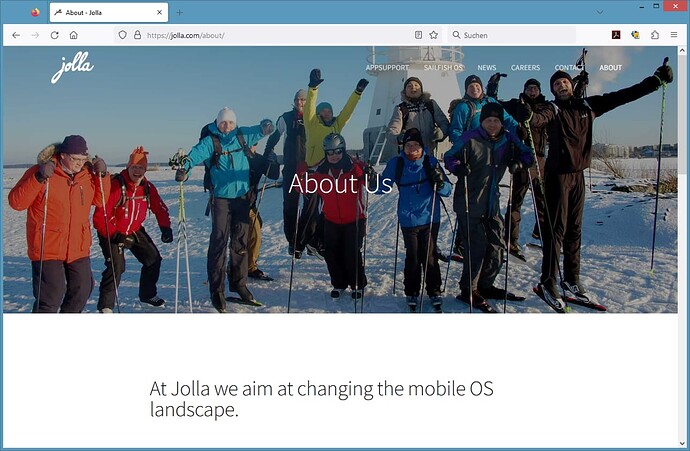Tranfered to whom, sorry?
Jollyboys is in fact the owner of the trademark, no?
Now that we know more about this, I am imagining how things went.
- After the Russian attack, nobody wanted to deal with a Russian-owned company.
- Jolla management wanted to buy the Russian-owned company share.
- The Russian owner (unsurprisingly) refused.
- Jolla management called their lawyers.
- The lawyers said, “That’s fine. Here’s an €50k invoice. Do not pay it.”
- The lawyers sued Jolla for not paying the invoice.
- The court forced Jolla to sell their assets to pay the invoice.
- Jolla management (following their lawyers’ advice) stepped in and said, “Hey guys, we want to purchase those assets!”
Below is an image of Jolla management offering to purchase the assets.

And, here is the commit for https://docs.sailfishos.org that change the copyright owner: Update copyright header by rainemak · Pull Request #382 · sailfishos/docs.sailfishos.org · GitHub
I wonder if after the legal situation has been cleared and a ‘cooling time’ has passed, they would be able to re-acquire back Jolla as company name (as indeed Jollyboys is not the greatest choice, IMHO)
There were a couple of funnier cases, also in Spain.
Nissan had a car called Moco. Moco in spanish means “Mucus”.
An the best one was the Mitsubishi Pajero which in Spain was changed to Montero, as “Pajero” means “Wanker”.
Forgetting a small detail, that such kind of transactions cannot happen against of the will of a 39% shareholder partner which deserved to receive back in payment as much as the Finland’s pension fund.
Even if the Finland’s pension fund might accept to left unclaimed its debt - a decision no any bureaucrat can take unless being sued and condemned to pay the public loss by their own pockets. This implies a judge or a some kind of court decision but the court/judge should have a good/valid reason to take such a decision even if s/he is keen to bend the law for anti-russian politics.
Because in zeroing the Finland debt, the picture does not improve but for RosTelecom, only. Unfortunately, there is no way to close any deal about the debts positions. Politics cannot be the solution for the problems they created.
Without the agreement of creditors in front of a ruling court, the management cannot sell itself the company assets that they manage especially leaving behind debts or at a tiny fraction of their value. It would be considered more than unfair and it would be challenged in court and the court will assign the propriety and the control of the newco to the previous shareholders possibly freezing it in the meantime.
They can buy the assets that they can reasonable demonstrate that they (morally) own and pay nuts for those are worth near nothing. Like this forum, for example. They (morally) own means convincing the opposing shareholders that they cannot claim about that results (a different business division or branch). Usually pointing out to them that such a business could never being created because their participation in the company. Equivalent to say: you cannot buy our part because our clients will not accept you as their provider nor business partner.
Finally the agreement can be legally viable when Finland can have a profitable company running its business in exchange of some kind of financial loss and Russia counterpart nothing to lose in letting them do. However, we will know more when the Jolla Oy company will be closed down because at the moment it still open but a badco.
The trick of splitting a company in a badco and goodco (or newco) is quite old and in court, it is just an accountable trick to not freeze a profitable business for too long bringing it to close down.
Therefore, in the Spiderman vs Spiderman scenario, the judge is missing… ![]()
Fell free to add the judge by yourself, here above a suggestion! ![]()
The transaction was mandated by the court. Rostelecom is a debtor, they cannot decide. At most, they can fire their management who sent the company bankrupt.
That would have been a better choice.
Here there is a small misconception (or a missing detail again) about basic accountability: when a credit is created a debt is created as well and viceversa. In this perspective, an owner, owns the debt but also the propriety (or the assets + current liquidity + future liquidity = activities).
In this panorama - the court can rule about the value of the assets - and accept that someone is going to pay for them to fulfill or partially fulfill the debt. Hence, the ownership accept the court decision because they agree about the estimated value of the assets + activities.
Here the main point is very clear: SFOS and related business worth nothing for both the parties.
Automotive business can generates value that will go to pay debts in place of RosTelecom. They would not pay their quota of the debts but the automotive revenues.
However, the risk would be that at these conditions the automotive business closes down. On the other side the RosTelecom cannot buy the whole company and run that business. It is a lose-lose scenario. In this case a company is usually split in two parts: newco and badco.
In this case - the SFOS - does not find its place in any of the two.
Which is quite an unicum especially in this case. Why creating a third company instead of publishing everything with an open-source license?
Well, pushing everything on a public git does not solve the open-source dilemma because untrained people will most probably ignore that open-source code. Or said in another way, the code can be published in full but it does not exist any developers community that it is able to take care of it.
what surprise!
Therefore the open-source dilemma was about does that “community” exist or not? No, just kids.
Hence the third company can be designed as gym in which developing juniors to seniors. This is a good compromise in both directions: senior supply for the automotive company and growing a developing community for the open-source components.
If Rostelcom was a shareholder in Jolla Oy then that means they part owned it and would not usually be a debtor. A debtor is a person or a legal entity which owes money to the company, whilst a creditor is a person or a legal entity that is owed money from the company. If Rostelcom invested money other than by buying shares (e.g. through a rights issue) then they would be a creditor if the company became insolvent and could no longer trade. In a ‘normal’ bankruptcy the company would be required to liquidate its assets to pay off its creditors in a specific order mandated by law. A shareholder in the company would basically lose the money it had invested in the company through the purchase of shares except in a small number of circumstances because, as part owners of the company, they are liable to share in its fortunes … or lack of them. At least this is how it works in English Law and I suspect Finnish law will not be much different.
There was another one… In the UK we have a furniture polish called ‘Pledge’. Although I cannot now remember the country concerned, ‘Pledge’ translated as ‘Urine’ in the language of that country - not the most attractive substance to do your housework with!
I fully agree our community is fanclub. I agreed on this just the moment I read your reply. What took my mind occupied these days is another aspect of the problem.
«What 's next?»
We currently have devices and operating systems that bringed no new imorovements since 2017.
Worst, after 2017 we lost access to API of many platforms and the more popular is a tool, the more the Owner tries to close it.
I don’t have the answer that can detail next action.
I can tell you all is that we (the people that believe FOOS is a PLUS by definition) should work to bring the tools under the control of people.
Biggest obstacle is that not all of us know we can have control over our HW and SW.
The more the tool will be for all, the more it can become innovation.
Can be both, depending if pending contracts or clauses are still in place. Without a clear picture of all the details cannot be said. However, a owner owns both credits and debts of a company.
I don’t think that’s very likely! At the very least the lawyers could be charged with a conspiracy to commit fraudulent misrepresentation and would almost certainly be disbarred by the law regulator from practising law in the future. You’re giving us lawyers a bad name ![]()
Well you are at least right on one point.
Yes, that is amazing, indeed!
And I am so happy that such a small team has achieved so much - and that they can continue sailing. Thank you for not giving up, sailors! I wish you all the best and wait in the harbour for all your releases yet to come.
I guess that the about-page of Jolla.com already shows a major part of the team:
Now, we may guess who is who ![]()
I understood it this way: Jolla Oy is cancelled by court, so Jolla Oy does no more exist after the change. The new Jollyboys is founded new as a successor but is a completely new company but with a lot of the former people/staff, and therefore the new name and new registration. Am I wrong?
Talking about the company name: how much sailors are fitting in a dinghy (i.e. jolla?). Does the company name limit the team size?
I count 13 people on the image. 13 is a good number! I wish you all good luck!
Live long and prosper!
Innovation is tricky even more tricky than business.
Supposing that we want embrace this path which seems counter intuitive because there is no value in adopting a platform that has not been designed for the smartphones market and never succeed in this market in any declination.
Accepting that because this HUGE barrier there is a HUGE opportunity behind, which makes sense.
The most effective approach is:
- do not reinvent the wheel - move to a Linux distribution just supported by its community
- do not create further barriers - choose such distribution for binary compatibility
- do not create useless stress - among those distributions choose one that uses RPM
These three points brings us to the conclusion that SFOS refactoring is necessary and it is the premise to keep it updated with as less as possible effort.
However, there are still in place 2 more HUGE issues:
- bring value for a customers niche to support a business and/or intercept interested developers
- deal with the closed source blobs which mainly are about hardware firmware and its support
This requires an architectural change of the system in order to introduce another PoV into this sector.
A recovery image was missing, clearly. This lack has been fulfill. At least, I did.
A recovery image is an essential tool for everything above but also a tool that have brought in another PoV, and this is its the most of its value. Because another PoV was more essential than a tool.
The first part of this PoV has been presented in SFSCON 2023 speech but the slides contains it in full.
The RedFish OS business presentation completes the picture about creating value for customers and which customers.
You might like it or not. You might like me or not. You might think that is enough or not. But that’s it.

